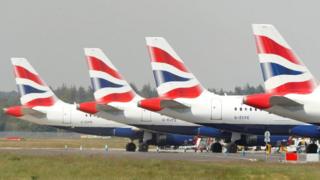British Airways: A breakdown in trust?
 Image copyright Reuters
Image copyright Reuters British Airways was once seen as a national champion, a potent symbol of the country’s commercial prowess and – as the airline itself puts it – of «timeless British values and modern Britain’s strengths».
Now, however, it is a company in crisis – struggling to cope with the huge financial impact of the coronavirus pandemic, its relationship with the government apparently fractured, and in conflict with its own employees.
There’s no question that BA, like other airlines, has been dramatically affected by the lockdowns and closure of borders associated with the pandemic. For weeks, it has been operating just a handful of flights a day, while the bulk of its fleet has been parked up.
But it is BA’s response to the crisis which has created an atmosphere within the company that staff have described as toxic, and prompted a political backlash.
In late April, its parent company International Airlines Group announced plans to implement a major restructuring programme at BA, which could lead to up to 12,000 redundancies. It said it would begin formal consultations with its unions, Unite, GMB and Balpa.
Launching that process, BA said it wanted to reach agreement over the proposals – which would also include significant changes to the terms and conditions of remaining staff. But it warned that if an agreement could not be reached, it would force the issue – by giving them notice, and offering them new contracts.
This apparent ultimatum has caused a bitter rift with the unions. Unite and GMB are currently refusing to take part in formal consultations. Balpa has been engaging with the company, but now says the negotiations are «hanging by a thread».
For cabin crew, there is not only the threat of redundancy, but also the possibility of big pay cuts for long-serving staff – in some cases of more than 50%. Many of those affected believe the company is using the current crisis to force through changes it has wanted to make for years.
Longer-serving crew at BA have contracts which are, by modern standards, relatively generous. They date back to an era when the airline industry was less ferociously competitive, before the emergence of budget carriers such as Ryanair and Easyjet forced older airlines to cut costs and change their business models.
In 2010, BA engaged in a bitter dispute with Unite over plans to overhaul cabin crew contracts. The row lasted two years and involved 22 days of strikes. Ultimately a settlement was reached, under which existing staff retained most of their privileges – but new joiners were put on inferior contracts, with lower pay.
Now, Unite says BA is using the Covid-19 crisis as cover to make «permanent, drastic cuts to jobs, wages and conditions», at a time when industrial action is not an option. The union is waging a high-profile campaign against what it calls the company’s «betrayal» of its staff.
The campaign has garnered some high-profile political support. One of BA’s fiercest critics is the Conservative MP and chair of the transport select committee, Huw Merriman.
He says the way in which staff at the company have been treated is «appalling». «It’s the equivalent of holding a gun to someone’s head,» he says. «It’s really sad to see an iconic brand being dragged into the gutter by its management».
When the redundancy plans were first announced, Balpa came to the negotiating table. Initially, the company did not threaten to «fire and rehire» pilots if they failed to accept new terms. But at the end of last week, that changed – and pilots were given the same ultimatum other employees were already facing.
According to Brian Strutton, general secretary of Balpa, that move «felt like a kick in the teeth to those people who had been carrying out negotiations in good faith». The union is still talking to BA – but he says the negotiations are «hanging by a thread» and could break down at any time.
Meanwhile many pilots have responded furiously. One BA captain told the BBC, «I wouldn’t say there was a lot of trust beforehand. There’s even less now». Another described the mood within the company as «terrible».
«I’m absolutely amazed at the huge outpouring of anger among our members», says Mr Strutton. «There’s outrage and despair at the way management are running the company they once loved working for».
A number of pilots have also voiced concerns that the row could have an impact on safety – with worries about their jobs and mortgages providing an unwelcome distraction for pilots on the flight deck, and potentially affecting their mental health.
All of this has left BA looking like a company under siege. A great deal of anger also seems to be aimed at Willie Walsh, the chief executive of parent company IAG, widely seen as the architect of the planned cuts.
The airline itself insists that the industry is «facing the deepest structural change in its history». It says it is acting now to protect as many jobs as possible – and that it wants to work with the trade unions to mitigate the impact of any changes. Although BA does have substantial cash reserves, it is currently burning through £20m every day – and with the majority of its fleet grounded, there is very little money coming in.
It is also feuding with the government over the introduction of a 14-day quarantine period for travellers coming into the UK – which Mr Walsh says has «torpedoed» the possibility of resuming flights in July.
Few within the industry expect a quick recovery. According to the International Air Transport Association, air traffic is unlikely to return to the levels seen last year until 2023. Around the world, carriers are cutting back – and BA’s direct rivals such as Easyjet, Ryanair and Virgin Atlantic are all planning thousands of redundancies.
But what marks BA out is the response to its actions – and the palpable resentment now directed at a brand that once invoked national pride.



